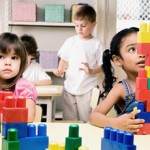Preschool Development Checklist
While there are a multitude of assessments to gauge preschool development, as an educator, mother of four, and now a grandmother, I would like to share some thoughts. And while it’s enormously tempting to measure, compare, worry and even compete, it’s hugely important to remember that all children develop at their own pace and in their own time.
 Preschool Development Checklist
Preschool Development Checklist
- A solid foundation in reality – Children need to understand how the world works and how they fit into it. This can be everything from where a bird lives, how the stars got in the sky, to who they are in their family and what a family is.
- An active imagination – Once we understand reality, it’s natural and healthy to create our own variations. Provide plenty of time and opportunity for imaginative open-ended play and honor their creative exploits.
- Care of self – Value and esteem come through participation. Preschoolers should be able to dress independently, tidy their room, participate in age appropriate household chores and get themselves a drink and simple snack.
- Be comfortable in their own skin – Meaning they can play independently, enjoy their own company and be content being quiet. It’s good for kids to know how to turn off the noise and hear the sound of their own inner voice.
- Listening and following directions – While listening provides opportunity for children to pay attention to what they hear, the ability to follow directions is enormously impactful at school and on the job. Remember, we all respond better to choices rather than commands.
- Ability to communicate verbally– Effective communication skills are essential throughout one’s life and development begins at home, in early childhood. Children need to learn to speak as well as listen, while continually building vocabulary through conversation and reading.
- Sequencing a series of steps – The simplest activities, like washing hands or getting ready for bed, involve a series of steps. Developing the ability to think and do in an organized way is the foundation of learning to organize and think in a logical manner.
- Pre-writing skills – There are years and years of writing ahead. Prepare your child with activities that develop fine motor control, hand eye coordination and their pincher grasp. These strengths will help them hold a pencil and master the physical act of writing.
- A basic understanding of number concepts – Young children should be able to count sequentially, recognize number symbols and understand that numbers represent quantities. There are multitudes of ways to practice number concepts as you go through the day with your child.
- A healthy view of self – Most of all, children need to know they’re loved, valued, and safe. Consistency, security, self-esteem and self-confidence are fundamental to a child’s emotional well being. The need to belong is especially strong in childhood and sets the tone of future personal relationships.
What is your child’s learning style? There are three basic learning styles; visual, tactile, and auditory. Take the test and get immediate results: Is your child a visual learner?
 |
Bette FetterFounder and CEO of Young Rembrandts and Author of Being Visual |










